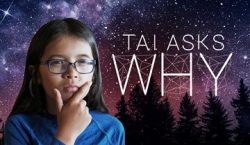- Home
- Tutorial
- Resource Guides
- Focus Areas
- LSF Programs
-
Professional
Development - Review Process
-
A project of LSF

Search for Resources
Description
This 20 minute podcast is from the CBC series “Tai Asks Why”, in which 7th grader Tai Poole tries to find answers to some of life’s biggest questions. In this episode, Tai talks with his friends, a NASA scientist and a Canadian environmentalist to try and find out ‘how we will fix climate change?’. In addition to gaining an understanding of the causes and consequences of our changing climate, students will learn how they, personally can work toward solutions.
General Assessment
Recommendation of how and where to use it
While the resource will support climate change outcomes included in some middle school science units, the best fit for this age group is found in those social studies programs that focus on citizenship.
Relevant Curriculum Units
The following tool will allow you to explore the relevant curriculum matches for this resource. To start, select a province listed below.
- Step 1Select a province
- Alberta
- Step 2Select a grade level
- Grade 6
- Step 3Select a subject
- Science
- Step 4Relevant matches
- Earth Systems: Understandings of the living world, Earth, and space are deepened through investigating natural systems and their interactions.
- Social Studies
- Step 4Relevant matches
- Citizenship: Understanding local, national, and global issues empowers individual and collective action toward an inclusive society
- Grade 7
- Step 3Select a subject
- Science
- Step 4Relevant matches
- Interactions and Ecosystems
- British Columbia
- Manitoba
- Step 2Select a grade level
- Grade 7
- Step 3Select a subject
- Social Studies
- Step 4Relevant matches
- People & Places in the World: Global Quality of Life
- Newfoundland & Labrador
- Northwest Territories
- Nova Scotia
- Step 2Select a grade level
- Grade 5
- Step 3Select a subject
- Science
- Step 4Relevant matches
- Science 5: Weather
- Grade 8
- Step 3Select a subject
- Social Studies
- Step 4Relevant matches
- Social Studies 8 - A Changing Canadian Society: Advocacy and Action
- Nunavut
- Ontario
- Step 2Select a grade level
- Grade 5
- Step 3Select a subject
- Social Studies
- Step 4Relevant matches
- People and Environments: The Role of Government and Responsble Citizenship
- Grade 6
- Step 3Select a subject
- Social Studies
- Step 4Relevant matches
- People and Environments: Canada's Interactions With The Global Communty
- Grade 7
- Step 3Select a subject
- Geography
- Step 4Relevant matches
- Physical Patterns in a Changing World
- Prince Edward Island
- Saskatchewan
- Yukon Territory
Themes Addressed
Air, Atmosphere & Climate (1)
- Climate Change
Citizenship (1)
- Community-Building and Participation
Governance (1)
- Democracy

